Class 6 Exam > Class 6 Notes > English Grammar for Class 6 > Nouns
Nouns | English Grammar for Class 6 PDF Download
What are Nouns?
- A noun is a word that names something, such as a person, place, thing, or idea.
- Example:
A person: like "Ram" or "Riya"
A place: like "Delhi" or "Australia"
An animal: like "dog" or "tiger"
A thing: like a "chair" or "laptop"
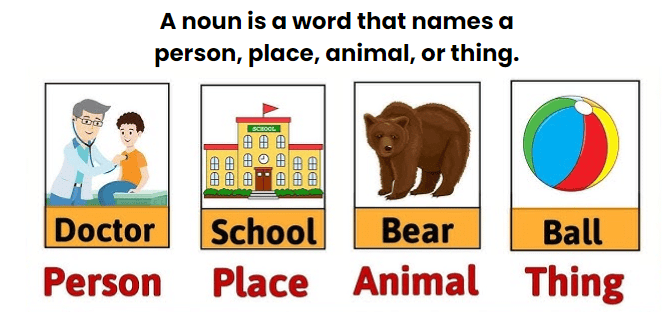
Types of Nouns
Nouns form a large proportion and come in a wide variety of types.
1. Common Nouns
- A common noun is a general name for any person, place, animal, or thing.
- For example, the word "girl" refers to all girls in general, not just one specific girl.
- Names like Radha and Priya are specific names and refer to one person each.
- Other examples of common nouns include words like cities, states, and boys, which refer to entire groups.
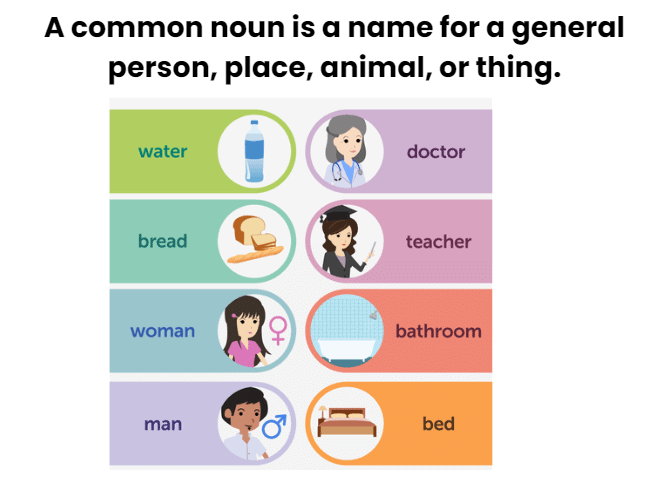 Example of Common Noun
Example of Common Noun
2. Proper Nouns
- A proper noun is the specific name of a particular person, place, animal, or thing.
- For example, names like Mumbai, Agra, Shruti, Dimple, Sahil, Yamuna River, and Red Fort are all proper nouns.
- Unlike common nouns, proper nouns refer to something specific rather than a whole group.
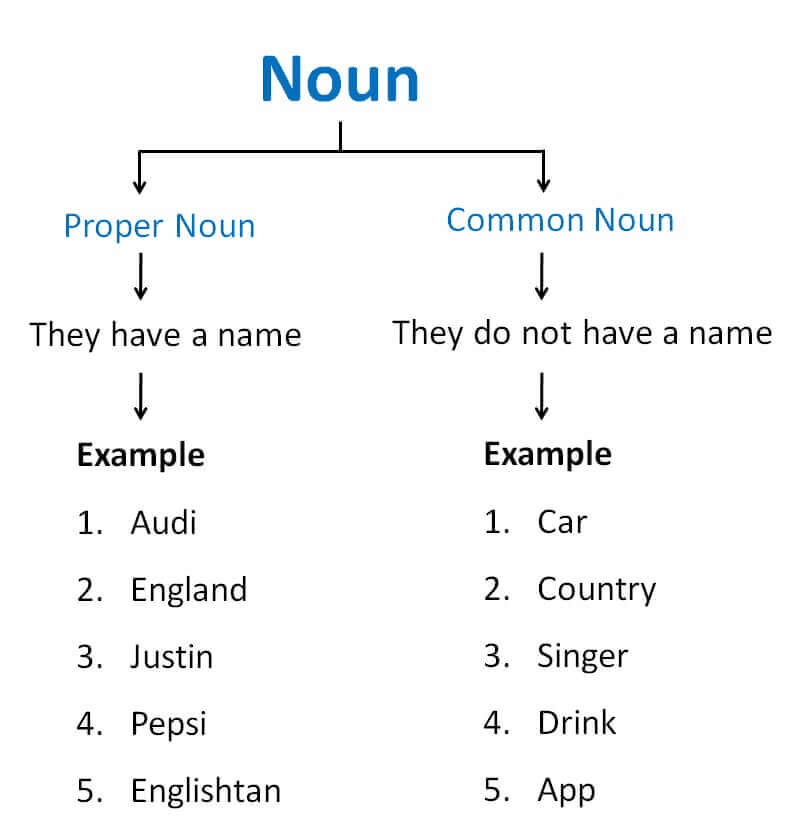 Difference between Proper and Common Noun
Difference between Proper and Common Noun
Question for NounsTry yourself:Which of the following is a collective noun?
View Solution
3. Collective Nouns
- A collective noun is a name used for a group of people, animals, or things considered as one unit.
- It refers to a collection of items as a single entity.
- For instance, an army is a group of soldiers, a swarm is a group of bees, and a flock is a group of sheep. A shoal is a group of fish.
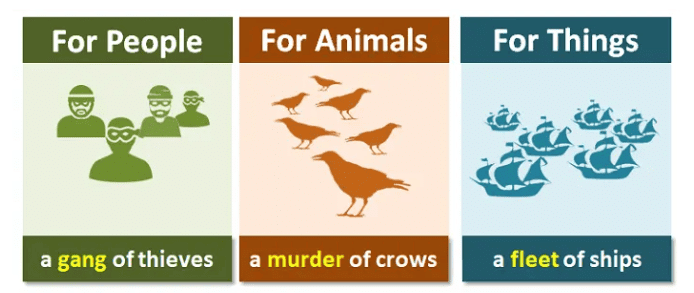 Collective Noun
Collective Noun
4. Material Nouns
- Material nouns are names of substances or materials from which things are made.
- Examples:
"This wardrobe is made of iron." (Iron is the material used to make the wardrobe, so 'iron' is a material noun.)
"Be careful, it is made of glass." (Glass is the material, so 'glass' is a material noun.)
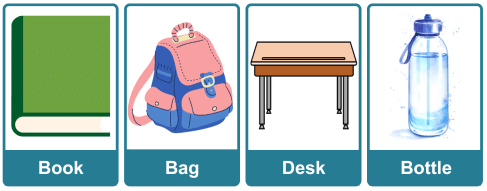 Material Noun
Material Noun
5. Countable & Uncountable Nouns
- Countable nouns are nouns that you can count.
- Examples:
"Do you have an extra pen?" (You can count pens, so 'pen' is a countable noun.)
"Jim owns a guitar." (There is one guitar, so 'guitar' is a countable noun.)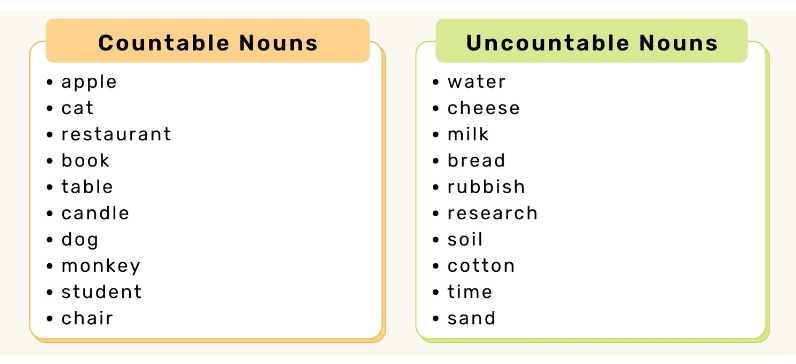
- Uncountable nouns are nouns that you cannot count as individual units.
- Examples:
"Do we have some rice?" (You can't count rice as individual units, so 'rice' is an uncountable noun.)
"I am going for a walk to get some fresh air." (You can't count air as individual units, so 'air' is an uncountable noun.)
6. Singular & Plural Nouns
- Singular nouns refer to just one person, animal, place, or thing.
- Examples:
"I adopted a cat from an animal shelter." (Here, 'cat' is a singular noun because it refers to one cat.)
"Robert is my best friend." (Here, 'Robert' is a singular noun because it refers to one person.)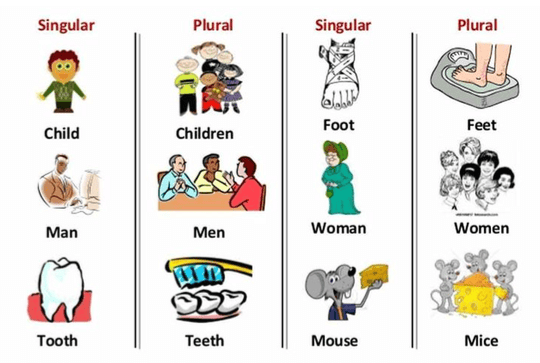
- Plural nouns refer to more than one person, animal, place, or thing.
- Examples:
"We need more balloons for the party." (Here, 'balloons' is a plural noun because it refers to more than one balloon.)
"There are many students in my class." (Here, 'students' is a plural noun because it refers to more than one student.)
Remember
- A', 'an' and 'one' are used with singular countable nouns.
Examples: a pen, an apple, a dog.- Countable nouns are qualified by 'many', 'a few' and numbers.
Examples: two pencils, a few children, many books.
7. Gender Nouns
- Gender nouns are specific to a particular gender and are used to describe people based on their gender.
- Examples:
"Robert is the landlord of this flat." (If the owner is a man, 'landlord' is the gender noun.)
"Olivia is the landlady of this apartment." (If the owner is a woman, 'landlady' is the gender noun.)
8. Abstract Nouns
- An abstract noun is a word that names a quality, feeling, or idea that we can think about or feel, but we cannot touch or see it.
- Examples: hope, honesty, health, courage, pity, joy, pain, sleep, death, etc.
Formation of Abstract Nouns
1. From Adjectives
- Kind → Kindness
- Able → Ability
- Brave → Bravery
- Generous → Generosity
2. From Common Nouns
- Patriot → Patriotism
- Brother → Brotherhood
- Companion → Companionship
- Servant → Service
3. From Verbs
- Act → Action
- Satisfy → Satisfaction
- Punish → Punishment
- Heal → Health
Question for NounsTry yourself:Which of the following is an abstract noun?
View Solution
The document Nouns | English Grammar for Class 6 is a part of the Class 6 Course English Grammar for Class 6.
All you need of Class 6 at this link: Class 6
|
49 videos|349 docs|46 tests
|
FAQs on Nouns - English Grammar for Class 6
| 1. What are the different types of nouns? |  |
Ans. The different types of nouns include common nouns, proper nouns, collective nouns, material nouns, countable & uncountable nouns, singular & plural nouns, gender nouns, and abstract nouns.
| 2. What is the difference between common nouns and proper nouns? |  |
Ans. Common nouns refer to general, non-specific people, places, or things, while proper nouns refer to specific names of people, places, or things.
| 3. Can you provide examples of collective nouns? |  |
Ans. Examples of collective nouns include a flock of birds, a herd of cattle, a team of players, and a school of fish.
| 4. What are countable and uncountable nouns? |  |
Ans. Countable nouns are nouns that can be counted or have a plural form, while uncountable nouns are nouns that cannot be counted or do not have a plural form.
| 5. How can gender nouns be identified in a sentence? |  |
Ans. Gender nouns can be identified by the use of pronouns such as he, she, or it, which indicate the gender of the noun they are referring to.
Related Searches

















